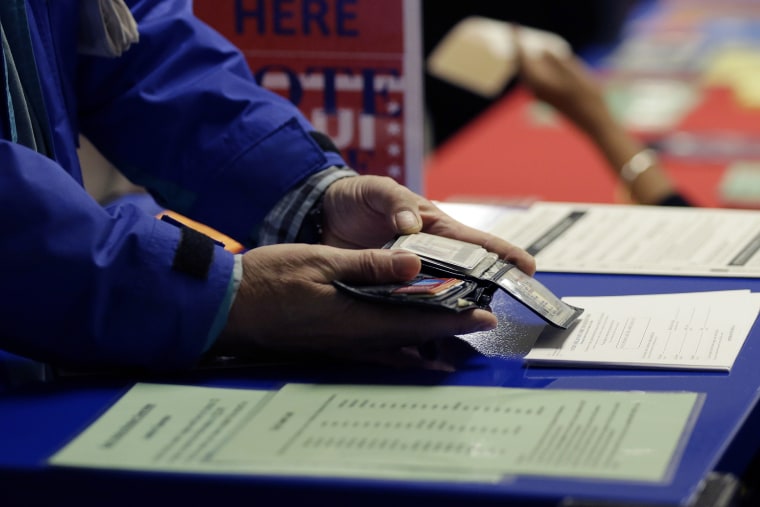For Republicans, requiring photo ID isn't just for voting anymore. They like the concept so much they’re now expanding it to cover government benefits that low-income Americans rely on.
In a growing number of states, and even in Washington, the GOP, citing fraud, is pushing laws that could deny needed benefits to those who are struggling, simply because they lack ID.
Studies suggest around 11% of Americans—including one in four African-Americans—don’t have a photo ID. Among those who receive government benefits, that number is almost certainly higher.
North Carolina’s GOP-controlled legislature—which last year passed a voter ID requirement as part of the nation’s most restrictive voting law— advanced a bill Thursday that would make recipients of jobless benefits also show a photo ID. It’s expected to pass next week.
Since March, people getting unemployment insurance in the Tar Heel State have been required to come into a state job center to meet with a job placement counselor within four weeks of getting aid. At that meeting, they’ve also had to show photo ID. Now lawmakers are set to make the ID requirement official.
Helping lead the push for the law is Thom Tillis, the Speaker of the North Carolina House, who is challenging U.S. Sen. Kay Hagan, a Democrat, in a race that could determine control of the Chamber this fall. Tillis also was a key backer of the state’s voter ID measure.
Imposing an ID requirement is just the latest stage in North Carolina’s effort to restrict jobless benefits. Last summer, the state cut off unemployment insurance for nearly 70,000 people, knowingly rejecting over $700 million in federal money that was meant to be used to extend benefits. Thanks to that rejection, another 100,000 lost benefits at the start of this year.
Other Republican-led states are even moving to require photo ID to buy food. Starting in July, welfare and food stamp recipients in Maine will have to show photo ID, under a program pushed by far-right Republican governor Paul LePage. He said transactions records show food stamp cards were used thousands of times at strip clubs, smoke shops, and bars, which isn’t allowed.
Georgia recently passed a similar requirement for food stamp recipients. Indiana and Pennsylvania Republicans have looked into the idea in recent years, but shelved it amid opposition.
And in Washington, Sen. David Vitter (R-LA) introduced his own food stamp photo ID bill earlier this year. The goal, said Vitter, was to “restore some accountability to the program so it's not ruined for people who use it appropriately."
Advocates for the poor say the requirements, like voter ID laws, could stop legitimate beneficiaries from getting the help they’re entitled to. "Many poor people do not have photo ID's, and it costs money they do not have to get them," Deborah Weinstein, executive director of the advocacy organization Coalition on Human Needs, told the New Orleans Times-Picayune in reference to Vitter’s bill.
As with voting, ID proponents cite the threat of fraud. Asked how much fraud North Carolina’s jobless benefits program has seen, Dale Folwell, an Assistant Secretary at the state’s Employment Security Department, didn’t give a figure. Folwell said the state has overpaid its program by around $4 billion over seven years—but acknowledged that many factors beyond fraud contributed to that total. He also cited an ongoing case, in which a woman stole her roommate’s benefits by swiping her Social Security number, in which he said a conviction was expected next week.
“The amount of fraud that we experience is somewhere between one case and $4 billion,” Folwell said.
How much of that unknown amount of fraud is the kind that an ID requirement will stop also isn’t known. It's true that, unlike in voting, there is a non-negligible amount of fraud tied to government benefits. Around $3 billion in fraudulent unemployment benefits were paid out in 2011, the government has estimated—just under 3% of total unemployment benefit payments. But an estimated two thirds of that fraud is what’s known as “concealed-earnings fraud”—that is, done by people who have a source of income but still collect benefits. That's something that wouldn’t be prevented by showing a photo.
And when it comes to food stamps, federal law requires that all household members must have access to the benefits on a food stamp card—so a photo doesn’t do much to stop fraud.
After looking into the issue in 2012, a Pennsylvania legislative concluded that food stamp cards with photos are “limited in their ability to prevent some of the most common types of fraud.”
But parsing the details may miss the point. The ID craze coincides with a broader conservative crackdown on Americans who receive government assistance.
A separate measure sponsored by Vitter last year would have banned those convicted of certain violent crimes from receiving food stamps--a move that the Center on Budget and Policy Priorities, a liberal think tank, said would have "strongly racially discriminatory effects." And numerous states, almost all Republican controlled, have lately passed or introduced laws that mandate drug tests for benefit recipients.
Research assistance provided by Parker Enix-Ross.
